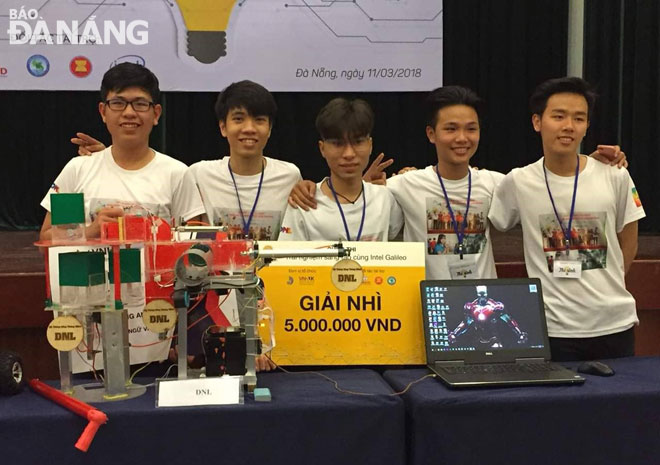Students-created smart sewer system features high practicality
In reality, waste washed away by rainwater flow into manholes, causing severe inside blockages, and sending a huge amount of trash into rivers and sea.
 |
| Hieu (centre) and his teammates receiving a second prize at the municipal-level ‘Creative Experience Competition with Intel Galileo U-Invent’ competition 2017 for their smart sewer system |
This fact of high concern, indeed, inspired Nguyen Quang Hieu, a student of the Faculty of Electronics and Telecommunications from the Da Nang University of Science and Technology and his friends to create a smart sewer which collects garbage so as to protect the environment, and reduce the hard and toils facing sanitarian workers.
This highly practical product is a firm commitment made by the students to the environmental protection in the strongly growing Industry 4.0, meeting the criteria: safety, convenience, and high efficiency.
Sharing about his idea, Hieu said his smart sewer system features 3 main structures: waste sensors, garbage collection, and storage units. With regard to its operation, the system will be placed in the waste pipeline, featuring the function of automatic identification of waste.
Accordingly, once garbage is detected in the pipeline, the system will activate the operation and discharge all the waste into the storage unit which is also placed underground. Next, sanitary workers will take the storage to the ground for waste collection, and then put it back into the system.
According to Hieu, the system is designed in the form of modules in which smaller units make up a larger unit; thereby ensuring easier assembly, upgrading and maintenance processes.
This product provides an effective solution to the problem of garbage backlog inside sewers, and saves too much on human labour as it features automotive functions from garbage collection to storage.
Another noticeable advantage is that the system does not affect the urban beauty because it is placed underground.
According to Hieu's calculation, the price of a sewer collection system now hovers at between 700 - 900 million VND, depending on the size of the sewer.
Each system can work well for more than 20 years. In reality, such metropolises as Ha Noi and Ho Chi Minh City, every year, spend about 1,200 - 1,500 billion VND for solid waste collection, transportation and treatment, accounting for about 3.5% of their budget expenses. Therefore, an automated garbage collection and treatment system is expected to save costs and protect public health as well.
Noticeably, Hieu’s brainchild won a second prize at the municipal-level ‘Creative Experience Competition with Intel Galileo U-Invent’ competition 2017 which was organised by the city-based Viet Nam-UK Institute for Research and Executive Education (VNUK). In addition, his team was the most favourite at the recent Startup Runway 2019 contest.
As for the future plans, Hieu revealed, his group is researching into suitable materials in order to increase the durability of the system to between 20 and 30 years. Besides, these talent students are planning to participate in more competitions for the seeking of venture capital funds, thereby step by step bringing their ideas into reality.